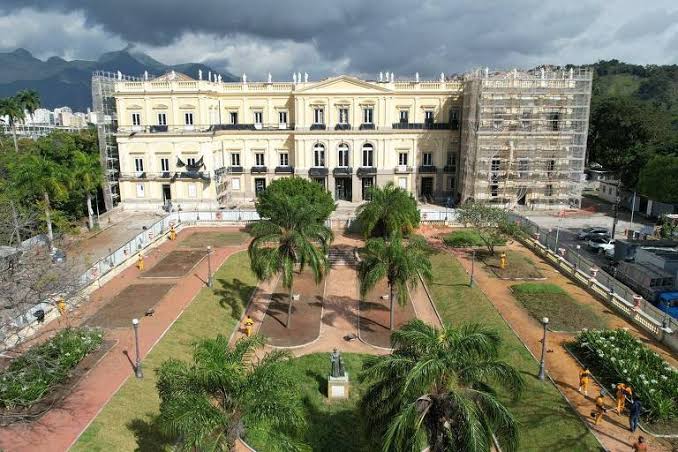Article in Folha de S. Paulo: Do we really need a Bible Museum?
Originally published in the Folha de S. Paulo’s website
The opening of the Pandemic Museum and the reconstruction of the National Museum take time to get attention in a country that has no memory
The Querino project podcast, by journalist Tiago Rogero, recalls, in its first episode, the history of the National Museum – the one that caught fire in 2018. The narrator remembers the building that was originally the royal family’s residence in Brazil, offered as a gift from Elias Antônio Lopes, a great slave trader.
With all the typical complexity of what is very Brazilian, at the same time the National Museum houses (among what was not lost in the fire) the richest geology, paleontology and anthropology collection in the country, besides being a major research center for Rio de Janeiro’s Federal University.
To reconstruct the National Museum, which began at the end of last year, around 35% of the R$ 350 million still needs to be raised.
In 2021, an initiative led by a group of professionals from different areas came with the idea of creating a Museum for the Pandemic in Brazil, a space (initially digital, later also physical) to remind us what we went through in recent years in the country.
“We learned from the past not to make the same mistakes in the future”, as they say in their campaigns.
The museum has so far raised just over BRL 60,000, out of BRL 360,000, the expected amount to have a large digital exhibition, in addition to educational activities and the entire management of the space.
While initiatives like this take a long time to get attention, or – as in the cases of the National Museum and the recently opened Museum of Ipiranga– are undergoing renovations that drag on for years, we have witnessed the processes of registration and publications for the construction of the Bible Museum in Brasília, a Federal District project estimated at R$ 26 million, according to the DF Department of Culture and Creative Economy, responsible for the construction bidding.
As a Christian, I am intrigued and strongly defied every day to practice Christianity on the streets, in this country’s prisons, in the trenches of racial inequality to walk with whom Jesus walked, speak with whom He spoke, listen to whom only He listened, defend who He defended: poor, outcasts, disabled, disregarded, and depraved women. All this implies living the Bible fully and constantly.
These teachings need to be ingrained in us, not in a museum. Let us place in museums relics to be learned. The Bible does not lack appreciation but respect, use and reuse, without recycling, but with revelation.
What must be in museums for pedagogical embarrassment and historical reparation is slavery, child and youth sexual abuse, racism, machismo, domestic violence, colonialism, authoritarianism, dictatorship and all kinds of dogma and legalism,
The Bible needs to be studied and lived not as a book of idolatry, but as a guide to faith and new standards and parameters based on reconciliation, compassion, tolerance. What differentiates us does not divide us.
I ask myself: What stories about our country should we tell?
How a “Museum of the Bible” can be more relevant than a project to protect the sad memory of the pandemic in the country or, yet, how many other public facilities suffer from the neglect of lack of investment, overcome by fetched constructions and uncivil ideas?
These are questions that I started to reflect on, emphasized in the Querino project podcast in its eight episodes.
The narrative of Brazil as a country without conflicts, contradictions and inequalities is what needs to be burned, and to give way to these other stories that have been protected thanks to generations of griots and people who lead their lives and their communities as true historical treasures. Let’s value that.

